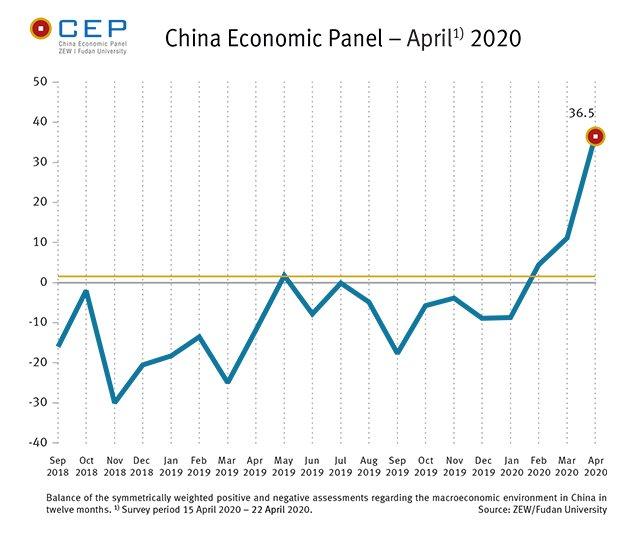Following severe economic consequences from the coronavirus pandemic, an improvement now seems to be in sight for the People’s Republic of China, with economic expectations rising sharply in the current survey for April (15–22 April 2020). The CEP indicator, based on the China Economic Panel (CEP) and reflecting the economic expectations of international financial market experts for China on a 12-month basis, currently stands at 36.5 points, 25.4 points higher than in the previous month (11.1 points in March 2020). The current economic situation is still relatively weak for the time being, however: the decline in China’s real gross domestic product (GDP) in the first quarter of 2020 was extraordinarily strong at minus 6.8 per cent, which experts had not expected. The monthly CEP survey among international financial market experts is jointly conducted by ZEW Mannheim and Fudan University (Shanghai). For the second quarter of 2020, the GDP forecasts from the survey experts are now only 2.0 per cent, compared to 4.2 per cent previously. “This downward revision of GDP forecasts is due to the surprisingly poor performance in the first quarter. China’s economic output in the third quarter, however, is expected to increase again by 4.2 per cent,” says
Dr. Michael Schröder, project manager of the
CEP survey and senior researcher in the
ZEW Research Department “International Finance and Financial Management”. The survey experts are forecasting real GDP growth of only 3.4 per cent for the entire year, compared with 4.3 per cent in the previous month. Growth forecasts for 2021 have also been reduced by 0.4 percentage points compared to the previous month, currently standing at 5.1 per cent. It is striking that the positive expectations are only partially reflected at the sector level. Estimates for important industrial sectors (chemical/pharmaceutical, electrical, mechanical engineering, and IT) continued to decline, with only the automotive industry, consumer/retail, and construction sectors showing a significant improvement in expectations. “It remains to be seen to what extent the economic policy measures, which are primarily related to monetary policy, can contribute to increasing economic growth,” says Schröder.
Download the corresponding data sheet and graph.
Über ZEW – Leibniz-Zentrum für Europäische Wirtschaftsforschung GmbH Mannheim
ZEW – Leibniz Centre for European Economic Research
ZEW in Mannheim conducts research in the field of applied and policy-oriented economics and provides access to important data sets for national and international researchers. The institute provides advice to policymakers, private companies and government institutions at both the national and EU level on how to tackle current economic policy challenges. The central concern of ZEW’s research is to analyse and design markets and institutions that allow for the sustainable and efficient development of knowledge-based economies in Europe. By keeping the public informed on its latest research and providing further training to researchers and business leaders alike, ZEW acts as a guide through economic change. ZEW was founded in 1991 and employs a staff of approximately 193, two thirds of whom are researchers. ZEW is a member of the Leibniz Association, a network of outstanding research institutes in Germany.
Research at ZEW
Labour Markets and Human Resources; Digital Economy; Economics of Innovation and Industrial Dynamics; International Finance and Financial Management; Social Policy and Redistribution; Environmental and Resource Economics, Environmental Management; Corporate Taxation and Public Finance; Market Design.
Firmenkontakt und Herausgeber der Meldung:
ZEW – Leibniz-Zentrum für Europäische Wirtschaftsforschung GmbH Mannheim
L 7
68161 Mannheim
Telefon: +49 (621) 1235-01
Telefax: +49 (621) 1235-222
http://www.zew.de
![]()
